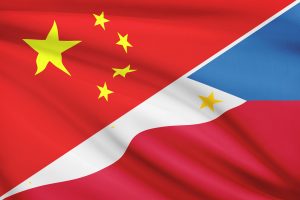China’s government summoned the ambassador from the Philippines yesterday and warned the country “not to play with fire” after President Ferdinand Marcos Jr. congratulated Taiwan’s president-elect Lai Ching-te on his election victory.
In a press briefing in Beijing yesterday, Reuters reported, Chinese Foreign Ministry spokesperson Mao Ning said that Marcos’ remarks “constitute a serious violation of the One China principle and … a serious breach of the political commitments made by the Philippines to the Chinese side, and a gross interference in China’s internal affairs.”
Mao added that China had “lodged a strong protest with the Philippines at the earliest opportunity,” and had summoned its ambassador, Jaime FlorCruz, “to give China a responsible explanation.”
“We suggest that President Marcos read more books to properly understand the ins and outs of the Taiwan issue,” Mao said, “so as to draw the right conclusions.”
Taiwan’s election, which saw Lai win the presidency but his Democratic Progressive Party lose its majority in the legislature, offered an opportunity for nations in the region to clarify their stances on the self-governing island.
For instance, Cambodia’s government and Myanmar’s military junta duly reaffirmed their adherence to Beijing’s “one China principle,” which holds that the People’s Republic of China (PRC) is the sole legal government of China, of which Taiwan is an inalienable part. Nauru took the opportunity to cut ties with Taiwan and formally recognize the PRC.
Marcos took the audacious step of referring to Taiwan in terms suggestive of a “normal” country. In a post on X (formerly Twitter) on Monday, the Philippine leader congratulated Lai “on his election as Taiwan’s next president,” and said that the Philippines looked forward to “close collaboration, strengthening mutual interests, fostering peace, and ensuring prosperity for our peoples in the years ahead.”
As I noted yesterday, Marcos’ post, with its implications that Taiwan already enjoys de facto independence, was always going to be received poorly in Beijing, which had already lashed out at a similar statement issued by U.S. Secretary of State Antony Blinken earlier in the week. It can’t help that the message also came at a particularly tense time in China-Philippines relations, following a year of growing tension in the South China Sea, where Chinese and Philippine vessels have recently had a string of dangerous encounters in contested waters.
The Philippine Department of Foreign Affairs has since Taiwan’s election twice reaffirmed that the country stands by its “One China Policy,” which it adopted when opening diplomatic relations with the PRC in 1975. This states that Manila “recognizes the Government of the People’s Republic of China as the sole legal government of China” and “fully understands and respects the position of the Chinese Government that there is but one China and that Taiwan is an integral part of Chinese territory.”
A terse statement on Sunday said simply that the Philippines remains “committed to its One-China Policy.” A follow-up statement yesterday attempted to soften and contextualize Marcos’ message to Lai, focusing on the fact that there are around 200,000 overseas Filipino workers, or OFWs, living in Taiwan. It said that Marcos’ message “was his way of thanking them for hosting our OFWs and holding a successful democratic process. Nevertheless, the Philippines reaffirms its One China Policy.”
While the Philippines’ policy officially remains unchanged, Marcos’ statement reflects the way that Manila has begun more actively to engage Taiwan “unofficially” on an economic and diplomatic level as the islands have become the focus of growing tension between China and the United States.
As long as these tensions continue, and Manila and Beijing remain at loggerheads in the South China Sea, such “unofficial” engagements are likely set to continue – whatever the view of China’s leaders.

































